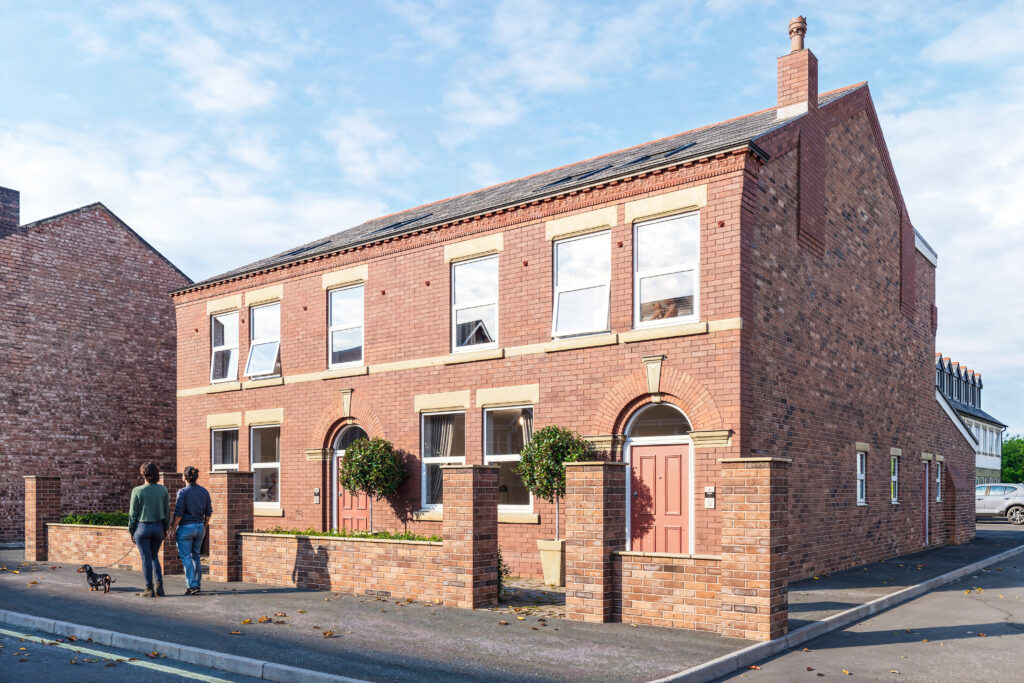Buy-to-Let Property Investment
Buy-to-let property investment is one of the most popular investment choices among both new and experienced investors. This is due to the strong performance of buy-to-let properties in the UK since the early 2010s. This strategy offers buyers the chance to benefit from growth in both property and rental values, whilst paying out strong yields each month.
Read on to learn more and see our buy-to-let properties for sale, or use the form opposite to contact our team and discuss your investment objectives.
READY TO INVEST IN BUY-TO-LET PROPERTY?
Enquire About Our Live Properties
What Is Buy-To-Let Property Investment?
Buy-to-let property investment is an investment strategy where an individual or business purchases a property with the intention of letting it to tenants. Typical buy-to-let properties are either residential homes or commercial premises. The rental income from letting the property creates a regular source of revenue for the investor.
Purchasing a buy-to-let property is a popular and relatively safe long-term investment strategy. This is because the property market is resilient, and historically it has shown consistent growth. Of course, past results cannot guarantee future performance. But, even in times of adversity, the property market has always recovered and exceeded previous levels.
Unlike short-term property strategies, such as buy-to-sell (commonly known as “flipping”), buy-to-let property investment benefits from rental income and capital appreciation (growth in property value over time). Generally, it is much more hands-off. The buyer only needs to front the money and then instruct a management agency to handle the day-to-day affairs. This makes buy-to-let ideal for investors looking for a passive income stream.
Is Buy-To-Let Property Investment Suitable For Me?
There’s a wide variety of investment strategies for new and experienced buyers to consider – from flipping to joint ventures. We find that, over time, property investors will often settle on a single, preferred method that they can repeat and scale. And with the exceptional demand for rental properties from the younger generations in recent years, we’re certainly seeing buy-to-let becoming one of the most popular methods. However, it’s not for everyone.
Consider the questions below to decide if buy-to-let suits you.
Are You Looking for a Quick Return on Investment?
By its nature, buy-to-let investment is a mid-to-long-term strategy. It doesn’t necessarily offer investors an immediate return on investment. Buyers usually pay a significant deposit, with the rest covered by a mortgage. The buyer then profits from whatever is left of the rental income after deducting costs (mortgage payments, insurance, repairs, etc). It can take years to recuperate the costs of the initial investment. But, long term, a sale could net the buyer a handsome profit if the property has increased in value.
So, if you’re looking for a quick return on investment, buy-to-let probably isn’t for you. You may be more interested in purchasing low-value properties, renovating them, and selling them for a quick profit. This is also a popular investment method but requires much more hands-on work.
Do You Have the Budget for a Deposit?
Buy-to-let mortgages are common, with many banks offering such products. However, they usually require a deposit of 25%. If you don’t have the savings for a deposit, you may want to consider other forms of property investment that require less cash upfront, such as REITs or joint ventures.
Do You Want to be a Landlord?
It sounds silly, but you must consider whether being a landlord is right for you. You are, ultimately, responsible for property’s upkeep, safety, letting, taxes, and more.
That said, much of the admin and maintenance can be outsourced to an estate agent or property management company, allowing you to sit back and enjoy the income more passively. Of course, using outsourced providers will eat into your profit margin, which is another thing to bear in mind.
CONTACT THE TEAM
Why Invest In Buy-To-Let Property?
There are multiple reasons why buy-to-let property is the preferred route to market for many investors, we’ve detailed some of the most common below:
Significant Capital Growth
Considering the various investment classes available to investors in the UK, such as residential, commercial, hotels, student accommodation, and healthcare, residential buy-to-lets are by far the most appealing. For example, JLL forecasts that Manchester property prices will increase by 17.1% on average from 2020 to 2025. This is simply not seen in other sectors.
This natural increase in property value can deliver huge profits for buyers when they’re ready to sell.
Regular Rental Income
The monthly rental income from a good buy-to-let property should cover all costs (mortgage payments, ground rent, etc) and still deliver a profit for the owner.
Research and careful planning is key in this regard.
Hands-Off Investment
Property management companies can handle all aspects of managing the rental property on the buyer’s behalf, such as finding tenants, organising repairs (if needed), collecting rent, and more.
This saves the investor time and effort, creating a hands-off, passive investment asset.
Leverage With Finance
It is a common misconception that having no debt is the ideal scenario. Having debt which is calculated and managed sensibly allows people to invest in additional properties they would not otherwise be able to.
By smartly and carefully utilising finance, particularly in combination with low mortgage interest rates, investors can potentially buy two properties and benefit from two times the capital growth. As equity builds, investors then have the option to grow their portfolio more aggressively.
Other investment classes are a lot more restrictive in lending. However, buy-to-let investors can choose from a wide range of mortgage products, typically at 75% loan-to-value (LTV), regardless of whether they buy as individuals or through a company. Buyers can also choose from a repayment mortgage or an interest-only mortgage.
Track Record Of Performance
The UK property market is a top-tier investment location that attracts significant capital from around the globe. As a developed country with a transparent legal system, strong economy, world-class educational institutions, global employers and limited capacity with an undersupply of housing, the UK has seen property values rise. This has been the case since records began.
According to official HM Land Registry data, the average property price in the UK in January 2000 was £84,620. As of October 2023, the average price is £287,782 – showing a consistent, steady rise which provides an ideal investment environment. You can use the UK Land Registry’s House Price Index to search house price statistics.
Significant Demand
The UK has experienced a fundamental undersupply of property for years. Developers cannot build fast enough. As such, all well-built properties sell quickly. In fact, most sell out before completion, during the construction period, which is referred to as off-plan property.
The government set a target of building 300,000 homes per year by the mid-2020s in their 2019 manifesto, which hasn’t been achieved.
We will likely see incentives from the government in the future and more relaxed planning constraints to encourage development. It’s not the demand the UK struggles with; it’s the supply – this is the core factor having a positive impact on values.
It’s worth noting that properties in Manchester, Liverpool and London are in particularly high demand from investors due to attractive rental returns and substantial growth potential over the medium to long term.
Various Budgets & Locations
Another benefit of the residential market is the level of variety.
Investing in most cities in the UK will generate a positive return on investment over the long term, but going into cities with the highest forecast growth makes a huge difference. For those with plenty of budget, London and Birmingham are great choices. For those with slightly lower budgets, we have the fast-growing Manchester and Liverpool. These are closely followed by great entry-level investment cities such as Leeds and Sheffield. There is plenty to choose from, catering to all budgets.
If you would like to know more, speak to our team about the forecasts and performance of property across the UK. We can provide postcode-specific data to enable informed investment decisions.
Wide Resale Market
Where To Purchase Buy-To-Let Property?
Buy To Let Properties For Sale





Causeway Waters, Staines-upon-Thames
- Greater London


We always encourage investors to purchase in the city-centre rather than the outskirts of town. It may cost more initially, but capital growth typically hits the city-centres first and then ripples out. Plus, global employers are setting up shop in cities such as London, Manchester, Liverpool, Birmingham, Leeds and Sheffield, to name a few.
This means professionals of all ages need to live nearby for work. When we combine this talent pool with the students who want to stay in the cities after graduating, it means there’s high demand for modern residential property. This boosts the rental market – perfect for buy-to-let investment.
For more information, we conduct yearly research into the best BTL areas across the UK based on rental yield.
Get In Touch
If you have any questions or would like to enquire about our services, please click on the button below to be redirected to our contact page. Our team is dedicated to providing exceptional customer service and we will do our best to assist you with any inquiries you may have.
Frequently Asked Questions
Can I purchase a buy-to-let property with a mortgage?
Yes, you can purchase a buy-to-let property with a mortgage. This is a common route for most investors and there are plenty of BTL mortgage products available. Typical LTV ratios for a BTL mortgage are 75%.
Even so, you will have to pay a deposit on Exchange of Contracts and will receive an agreement in principle for your chosen property. When the property gets closer to completion, your offer will be formalised. Learn more about BTL mortgages.
Other types of property offer higher yields. Are they better?
There are plenty of income-focused investment strategies available. HMOs, short-term lets, student accommodation, and care homes can offer remarkably high yields, for example.
However, the security and capital growth seen in residential buy-to-let property is unmatched, so if you want to see the property value increase aggressively over time, it’s the best choice.
Considering your overall return on investment, when comparing like-for-like, residential buy-to-lets are typically superior.
However, if you are just focused on the income, we can show you how to safely invest in other asset classes to achieve a net rental yield of 8-10%, one example being student accommodation.
How much is the Stamp Duty Land Tax on buy-to-let property?
This will vary greatly depending on your purchase value and circumstances, take a look at further information from the UK government website. Alternatively, you can read our short guide to SDLT rates for BTL properties.
What other taxes do I need to consider?
Stamp Duty Land Tax is the only tax you’ll pay when purchasing a BTL property, but moving forwards you may also have to pay tax on your rental income, and tax on the sale of the property. The type and scale of the tax will depend on how you structure the ownership of the property, and your personal tax band. For more information, check out our guide to buy-to-let taxes.
What’s the best city for a buy-to-let in the UK?
We spend a great deal of time conducting research, looking at the latest data and forecasts, and combining this with our experience and knowledge of the buy to let market. As such, we can form a solid opinion of the best investment locations based on your personal circumstances.
Two popular choices are buy-to-let in Manchester and buy-to-let in Liverpool. Both are seeing strong demand from investors currently, but we will work with you to advise appropriately.
Are there payment plans available?
Is it better to buy through a Limited Company? Can you help set one up?
When purchasing property for investment, it can be more tax-efficient to purchase through a limited company. There are various other benefits too.
We can assist with the full set-up and ongoing management of your company and accounts for a low monthly fee. Get in touch with the team for further information.
We can look after all aspects of the investment process – sourcing, consultation, due diligence, company formation, mortgage brokers, site visits, construction updates and property management.
What does Nick, our founder, think?

“The residential market is typically the go-to for new investors, and it is fundamental at an institutional level.
As an investment class, it offers the most attractive capital growth prospects, and, when looking at the track record of the UK property market, it’s a stable medium to long-term hold – providing the security that investors look for.
This resilience was evident throughout the COVID-19 pandemic, especially in comparison to the volatility seen in the stock markets.
Furthermore, we know there is a significant undersupply in the UK property market, yet demand for city-centre locations is substantial. This means a quality buy-to-let will attract young professionals willing to pay a premium rental price for a desirable location, convenience, quality, and the positive lifestyle experience seen in developments with onsite facilities”.
Nick Hyland, Director
Contact Us
Related Posts
All information is accurate as of January 2024.







